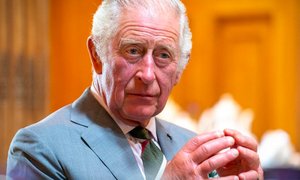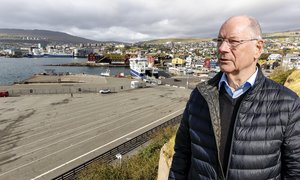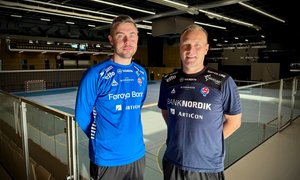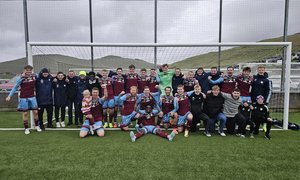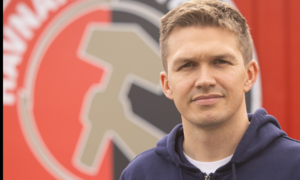There is something quite indomitable about the Faroes. Born of fire from the very center of the earth, sculpted by ice and wind and wave, at once a refuge and a stepping-stone for intrepid explorers, often ignored and more often plundered, it has endured, even flourished, and the people of the Faroes evince a most remarkable spirit of forbearance and determination.
I did not know any of this, of course, when I first arrived with my wife some eleven years ago. Friends offered only that the archipelago was remote and gloriously peaceful with a pleasant, maritime climate, not too cold and not too hot, which suited me just fine after the hustle and bustle and continuous meltdown of tropical Hawaii.
Shortly after our arrival, I set up my international law practice and business consultancy and began the rounds of introducing myself to anyone and everyone who could spare the time for a cup of coffee. In those early days, the economy was flat, even melancholy, and there were many who welcomed the diversion of a chat, even though most were somewhat mystified, to put it gently, that someone from Hawaii could be so enthusiastic about their rain-soaked country with its sodden economy.
But I was indeed and the more I went about the country, and the more cups of coffee and sweet cakes I savored, the more I began to notice and appreciate that remarkable indomitable spirit of the Faroese bubbling and oozing about. I remember sitting in a remote farmhouse one evening enjoying the pleasant company of a farmer and his artist wife, as they graciously listened to my endless tales of growing up on a Colorado ranch. The talk, however, thankfully soon turned to wool, the Faroese gold of old, and how it could and should be better exploited. They had a dream. They wanted to gather in the wool from most of the 70,000 Faroese sheep and turn it into first-class woolen products, not just simple sweaters mind you, but real designer fashions. They began small, and success followed success.
Their profitable endeavor came as no surprise to me. The Faroese have been pulling off this sort of thing for centuries. Take Jónas Bronck, for example. Born in Copenhagen, the son of a Danish Lutheran minister, he was raised in the Faroes. As one could well imagine, growing up in the Faroes Jónas was quite at home on the sea and eventually acquired a sailing vessel from Holland, aptly named De Brand van Trogen, or essentially the Fire of Troy. Perhaps a history refresher would be helpful here. As you may remember, survivors of the fall of Troy sailed westward across the Mediterranean – and proceeded to found Rome.
A few odd centuries later in 1639, Jónas Bronck sailed westward across the Atlantic in his sturdy Fire of Troy and settled a bit of land in the new world that would later be known as The Bronx. Jónas was, however, not as ill-prepared as his Trojan predecessors. He is reputed to have brought along with him a small library of some fifty volumes, which included the Bible, of course, as well as books in various languages on agriculture and navigation and, given his connection to Holland, not surprisingly, a book on how to build a windmill. Apparently for years it was the largest collection of books in America. Now Jónas knew the realities of living in a harsh environment and he brought along good quantities of building supplies (scare at even the best of times in the Faroes) and skilled builders. He even arranged for the services of a practiced chimneysweep. Very practical.
Which points to another trait of the Faroese that I have found most intriguing. Surrounded by not much of anything except what their wits could claim from the sea, they have managed to produce a most remarkable society and at the very heart of that society is a streak of practicality that the world would do well to adopt. A case in point involves that remarkable bit of technology known as digital terrestrial television (DTT). After analogue TV was shut down in the Faroes, a local company launched what is reputedly the world’s first commercially viable DTT system. The company does not boast a staff of hundreds, nor even dozens. On the contrary, it has but three multi-talented folk. Practical as ever, there is no billing department. Billing is computerized and the sophisticated software system developed by local Faroese software engineers knows when you don’t pay and shuts off your access to signal. You pay, you watch. Simple, efficient, and oh so practical.
The United States as well is well known for its practical nature and everyone knows that teamwork and practical collaboration is the spirit of the age these days, but the Faroese and the Americans long ago exhibited a rather unique talent for practical collaboration. During that chaotic bit of history known as the American Revolution, the Americans and the Faroese teamed up in a quite remarkable demonstration of their combined practical resourcefulness.
As everyone knows, the British and the American colonies were having their ups and downs at this particular time in the late 18th century and trade between the two countries was complicated to say the least with all sorts of trade tariffs in place. Thus entereth a smart Danish businessman resident in the Faroes who wangled a Royal remit in 1766 to transport goods from America for „temporary“ storage in the Faroes. The goods were then later transshipped in Tórshavn harbor and brought into British ports duty free.
This was a time of unprecedented prosperity in the Faroes. Tórshavn harbor was alive with activity and the lingua franca of the harbor was English, and for good reason. It is recorded that at times upwards of fourteen ships sporting American flags lay alongside each other waiting a turn to discharge their cargo.
In the midst of all this, the Faroese national hero, Nólsoyar Páll, emerged and began to carve out his destiny. Born on the small slip of an island across the sound from Tórshavn, he ventured to sea in 1786, undoubtedly on board one of the ships sailing between the Faroes and America. Soon he was a captain in his own right, sailing his own vessel for an American trading company.
Eventually, in 1800, Nólsoyar Páll settled down in the Faroes nearby the statue later commemorating his life and his struggle for the people of the Faroes. He had been greatly influenced by his association with America and its newfound freedom and championed the rights of the Faroese at every opportunity. Sadly, he was lost at sea in 1808, bound for the Faroes from Britain with desperately needed grain and supplies.
Now I have no doubt that the British tradesmen of the time were a bit surprised to discover loads of rum, tobacco and other trade goods emanating from the wind-swept archipelago to their north known only for its woolly stockings, but the price was right and the trade continued for some thirty years. Why not, it was a very practical solution to a very intractable situation.
The Faroes is now faced with another intractable situation: accelerating globalization and the critical need to fashion a profitable comparative advantage for itself. Not the easiest of tasks for even the most entrepreneurially sophisticated of societies, yet the Faroese have cleverly and patiently crafted a plan, and now all that remains is but to execute it. I refer, of course, to the country’s Vision 2015, the hope and dream that the Faroes will become one of the most progressive nations of the world by 2015. A bit audacious some might say, but I for one am the eternal optimist, and I must admit the dream seems to ring true, given the country’s history of patiently and steadfastly striving for excellence in a very practical way.
This being the case, it comes as no surprise that other Americans have picked up on the remarkable potential for tremendous economic and social development possessed by this unique microcosm of a country, nestled in the heart of the pristine North Atlantic Ocean. By way of illustration, several years ago I participated in the launch of Intel’s new Centrino WiFi chip. I had written to Sean Maloney, current executive vice president of Intel and then in charge of their WiFi program, sharing with him the extraordinary engagement of the Faroese in the wireless world. He immediately returned my email and we set up a series of teleconferences. Maloney was captivated by what the Faroese had done with long-distance wireless signals and wanted to feature the Faroes and its very practical accomplishments at a huge event in Las Vegas launching the new Centrino chip. The end result was a five-minute portrait of the Faroes that featured not only grass roofs, but also some very remarkable technology put together in a very practical and efficient way.
Now promoting the Faroes and its potential is a pleasant and engaging task and over the years I have nurtured relationships with a variety of international business people, all of whom share a common vision in the potential of the Faroese and what could be their amazing destiny. Many of my colleagues have visited the Faroes, liked what they saw and returned to their distant shores to await the evolution of opportunity. Now it would appear that the waiting is over. Faroese entrepreneurs are starting more and more internationally interesting businesses. Local investors are lining up to take advantage of opportunities both within the Faroes and beyond, often linked with international and especially American entrepreneurs and seasoned venture capital funds.
Again, this interest is not surprising. The Faroes sits in the heart of the North Atlantic astride the remnants of the Gulf Stream. As a consequence, it is extremely well positioned for all types of maritime research. Efforts are now underway to forge an oceanographic research consortium that will diligently and systematically tap into the tremendous research potential here, whether it be focused on the study of the ocean currents or fluctuating fish stocks or climate change. As an island nation, the Faroese are extremely concerned about the environment and issues of sustainability. In this light, green energy is yet another fascinating topic in the Faroes and a study is underway to investigate the practicality of using the constant rhythm of the waves to generate power.
To capitalize on this growing interest in the Faroes and to foster accelerated collaboration with the international business community, I recently formed another new company, Rainmaker Partners, in association with Tróndur Djurhuus, a talented business and community leader who understands and practices the Faroese art of patiently and steadfastly achieving the most practicable solutions to the most intractable problems. Even though we only recently launched the company, we have already entered into a number of collaborative agreements with eager international partners to facilitate and promote the development of some highly imaginative and potentially profitable initiatives that are all grounded in Faroese expertise. This bodes well for the future.
Personally, I find the growing international focus on the Faroes and the entire North Atlantic region as a whole to be most exciting and deeply satisfying. The visit by former President Bill Clinton to the Faroes is but one powerful manifestation of this growing interest. Now I would not be surprised that once President Clinton shares his experiences in the Faroes with the Honorable Senator from New York, that both of them might well wend their way back to the Faroes in the not too distant future to relax a bit in this most peaceful and enterprising corner of the planet and to seek out a quiet cup of coffee with a newfound friend or two to catch up on the latest trends in the Faroes. After all practical, resourceful folk usually enjoy chatting with other practical, resourceful folk. And no doubt two residents of New York might well find it rather enjoyable to walk along the street in Tórshavn commemorating the intrepid Jónas Bronck and his incredible adventures long ago in the new world.
Michael Paul Reveal holds a juris doctorate in law from the University of Hawaii. He and his wife, Lynn Reveal, have resided in the Faroes since 1996. His company, Reveal International, provides legal and business consultancy services worldwide. He recently formed Rainmaker Partners with Tróndur Djurhuus to focus on strategic investment options for local and international investors, especially focusing on projects grounded in Faroese expertise and talent.





